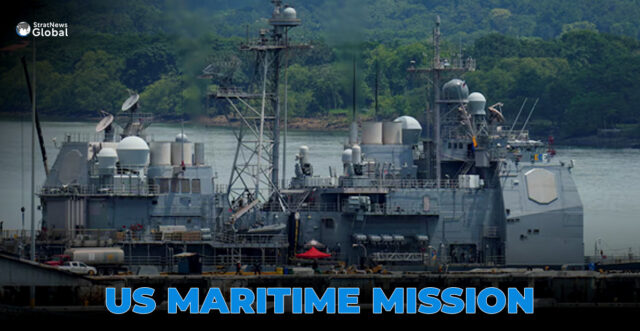U.S. President Donald Trump’s administration is pursuing a mission to diminish China’s global port network and place more strategic terminals under Western control, according to three sources familiar with the plan.
The drive is part of the most ambitious effort to expand U.S. maritime influence since the 1970s and is designed to address growing fears in Washington that it would be at a disadvantage to China in the event of a conflict.
Trump administration officials believe the U.S. commercial shipping fleet is ill-equipped to provide logistical support for the military in time of war, and Washington’s dependence on foreign ships and ports is excessive, the people said.
Options the White House is considering include supporting private U.S. or Western firms to buy Chinese stakes in ports, the three people said. They did not mention any specific firms other than to cite BlackRock’s proposed deal to buy the port assets of Hong Kong’s CK Hutchison in 23 countries, including the Panama Canal, as a good example.
The sources asked not to be named because they are not authorised to discuss the matter publicly.
The White House and U.S. Treasury did not respond to requests for comment.
Besides Panama, U.S. officials and lawmakers are concerned about Chinese maritime infrastructure holdings in places including Greece and Spain, the Caribbean, and U.S. West Coast ports, according to the sources.
China conducts normal co-operation with other countries within the framework of international law, a spokesperson with China’s diplomatic mission in Washington said.
“China has always been firmly opposed to illegal and unjustifiable unilateral sanctions and so-called long-arm jurisdiction and moves that infringe on and undermine other countries’ legitimate rights and interests through economic coercion, hegemonism and bullying,” the spokesperson said.
Officials in Beijing did not respond to a request for comment.
“The U.S. government sees Chinese investments in global ports as a huge threat to its national security,” said Stuart Poole-Robb, founder of risk and intelligence advisers KCS Group.
“The concern is that China could leverage its control over these assets for espionage, military advantage, or to disrupt supply chains during geopolitical crises,” he said, citing conversations with U.S. security counterparts.
Greek Port In Focus
The U.S. intends to look at Chinese interests in the Greek port of Piraeus, the three sources said. Situated in Athens, in the eastern Mediterranean, Piraeus is a pivotal hub on the trade route linking Europe, Africa and Asia.
COSCO, one of China’s biggest port and shipping groups, holds a 67% stake in the Piraeus Port Authority company.
Some Chinese investors are concerned Washington may want to target COSCO’s operations in Greece, a source close to Chinese investors involved in Greek shipping said.
COSCO and the Greek government did not respond to requests for comment. Greek officials have told Reuters previously that they have not been informed about any plans to change control of Piraeus.
Washington already has COSCO in its sights.
The Department of Defence added state-owned COSCO to its blacklist of companies with links to the Chinese military in January.
While the designation does not involve immediate bans on U.S. companies doing business with those listed, it can act as a signal that further action is being considered.
“The United States intends to attack China’s international influence by exaggerating the ‘China threat theory’ and use this as an excuse to force allies to take sides in supply chain arrangements,” the Development Research Centre of the State Council, an official think-tank of China’s governing cabinet, said in a paper published last month.
The U.S. administration has unveiled measures to increase America’s thin commercial maritime presence around the world, including by encouraging domestic shipbuilding, is looking to expand access to U.S.-controlled shipping registries, and is also reviewing global maritime chokepoints for shipping risks.
China owns or leases an extensive network of ports through companies, including COSCO and other state-controlled enterprises such as China Merchants and SIPG in Shanghai.
According to a report published last year by the Council of Foreign Relations, a U.S. think-tank, China had investments in 129 port projects worldwide through various companies as of August 2024.
China’s shipbuilding industry is also estimated to be 230 times larger than U.S. shipyard capacity, meaning it could take decades to catch up, according to U.S. Navy estimates.
The U.S. maritime push has contributed to tensions with Beijing, which sees port and shipping assets as integral to its Belt and Road initiative, at a time when the two superpowers are already at loggerheads over trade and tariffs.
(With inputs from Reuters)





